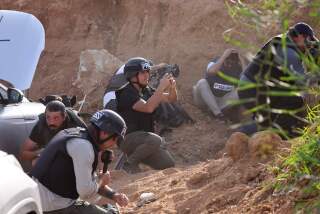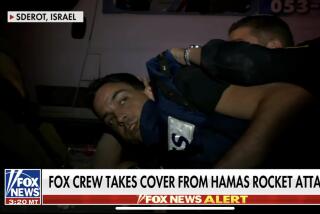Networks Brace for Gulf Action
- Share via
NEW YORK — As the United States prepares for a possible military attack against Iraq, executives at CNN and the three major broadcast networks say that they plan to have reporters in Baghdad to cover the bombing.
Details are still to be worked out, but all four networks have correspondents in Baghdad now and are moving to beef up their presence in the Iraqi capital as well as in Bahrain, Tel Aviv and other sites in the Middle East.
“We anticipate being able to stay through whatever problems there are in Iraq,” Bob Murphy, ABC’s senior vice president for hard-news coverage, said in an interview. “The Iraqis have granted us visas to have one team of people there over the past several weeks, and there’s no sign that they’re going to exclude us” in the event of an American airstrike.
Such multi-network coverage would be different from the early days of the Persian Gulf War. In 1991, the broadcast networks had correspondents in Baghdad at the time of the U.S.-led attack on Iraq. But communications lines were cut, and CNN, which had its own dedicated communications link, was the only American network that was able to stay on the air for hours through the bombing. The dramatic phone reports from CNN anchor Bernard Shaw and correspondents Peter Arnett and John Holliman were a major coup for the 24-hour news network.
Network executives were wary of discussing their coverage plans for the threatened U.S. attack on Iraq, which sources say could come as early as next week. But this time, as one news executive put it, “the Iraqis appear to have decided that it’s to their advantage to have full coverage” of any attack. The United States, in a move that is not supported by all of the Gulf War allies, has said that it will launch air strikes against Iraq if President Saddam Hussein does not allow U.N. inspectors free access to inspect its chemical and biological weapons sites. President Clinton plans to address the nation Tuesday night about the prospect of military action against Iraq.
The Pentagon plans to meet later this week with the Washington bureau chiefs of the major networks to discuss plans for coverage of U.S. military action, which could widen to include the deployment of troops if a diplomatic solution cannot be reached. CNN has applied to the U.S. government to open a permanent bureau in Baghdad. But the U.S. has not acted on the request, which was first presented several months ago.
“The people who could act on that request are the same ones who are deciding on possible military action,” White House press secretary Mike McCurry said in an interview.
As with the opening of a bureau in Havana by CNN recently, U.S. permission is required because of economic sanctions against Iraq.
“We’re going to have to decide whether there’s a greater good to be obtained” by allowing CNN to open a Baghdad bureau, McCurry said. “Iraq has not demonstrated any willingness to be a free and open society, and it’s likely that there could be attempts to manipulate and distort news coverage.”
*
Explaining the U.S. reluctance, another U.S. official said, “There’s a concern that the Iraqi government will try to portray themselves as the aggrieved party when we’re the ones who care about the Iraqi people.”
“This is a matter of principle with us,” Eason Jordan, president of CNN international networks, said. “We’re going to be there either way--and we’re going to uphold the highest journalistic standards.”
CNN already has 20 people in Baghdad, Jordan said. Having bureau status would mean that the network would have permanent facilities and correspondents there.
During the early days of the Gulf War, the cable network’s Arnett, who stayed in Iraq, was criticized by then-Sen. Alan K. Simpson (R-Wyo.) and others because his reports had to pass through Iraqi censors. They questioned whether a bombed building identified as an Iraqi “milk factory” was such a benign site.
This time, if the Iraqis continue on their present course, all of the major networks will have to find ways to get around Iraqi “handlers” and possible propaganda.
“We don’t know yet what controls might be put on us,” said NBC News Vice President Bill Wheatley, “but we’re going to try to be as independent as possible in our reporting from Iraq.”
At the other end of the spectrum, U.S. news organizations will have to deal with their own government’s restrictions on coverage.
“We’re going to be at the mercy of the government’s pictures of their targets from the air,” one TV executive noted.
During the Gulf War, the U.S. and its allies imposed pooled coverage and other restrictions on news coverage; in retrospect, many media critics say that such restrictions caused the networks to exaggerate the accuracy of “smart bombs” and other tactics during the war.
Network executives said they expect the Washington bureau chiefs to press for more independent coverage in their meeting later this week with the Pentagon.
More to Read
The biggest entertainment stories
Get our big stories about Hollywood, film, television, music, arts, culture and more right in your inbox as soon as they publish.
You may occasionally receive promotional content from the Los Angeles Times.










